Am a better craftsman after 40 years of writing: Jeffrey Archer talks about storytelling
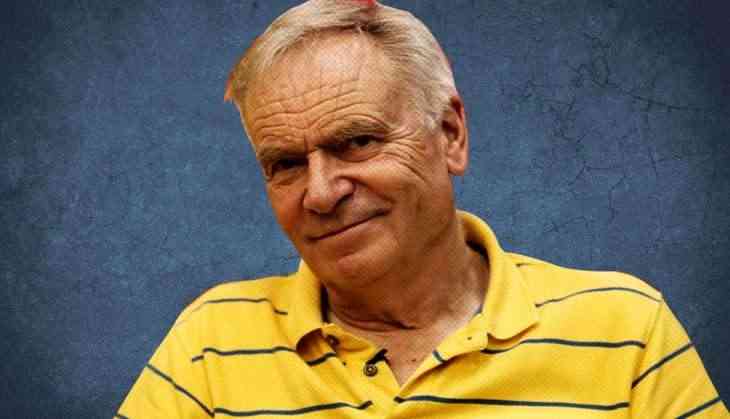
He started writing in 1974, when he was 34, almost 35 - Not a Penny More, Not a Penny Less. His first book sold just 3,000 copies and didn't do even a fraction as well as his other books eventually would. 40 years plus and counting - there isn't another author you could bank on to churn out one best seller after the other.
And there he was, Jeffery Archer, happy in his striped yellow polo shirt, ready to crack a joke or two - at your expense maybe.
To be very honest, the first book of Archer's that I fondly remember is the 12 Red Herrings. Hands down it is one of the best collection of short stories I have ever read. Post that while I flitted intermittently his books, for us bibliophiles, he has been one author you cannot strike off the list no matter what.
When you meet him, you'll know exactly why.
"Story telling is a strange gift. If I could tell you how to do it, anyone could do it. It's not like I am hiding it from you, really don't know!" he laughs as he spoke to the press and some fans on Monday evening at Gurgaon's Cyberhub.
Later in the evening, he took on a bigger crowd to answer questions and discuss his latest book This Was a Man - the last book of the Clifton Chronicles that began with Only Time Will Tell.
It's been seven books and the Clifton saga is now complete, but Archer has no plans to stop. A new book with 12 short stories is scheduled for next year.
Wonder how he manages to do this at this age, when we, can hardly pull off a full day at work without complaining about it? So here's how - "I wake up at 5:30am. I start work at 6..." he beams. Working in two-hour shifts, Archer says that he thinks three pages in advance always. And, he never reads a book when he is writing.
What about expert tips for writers to be? "Write about what you know, and the reader will feel at ease," says Archer.
It is exhausting to hear him speak about his routine, which he says works for him because of all the training he got as an athlete (which made me feel infinitely worse about myself, thankyouverymuch).
Speaking about his fan-base in India, Archer said, "You love story tellers out here and still respect authors." "Aspirational people read my books," he added explaining why his books work as well as they do here.
And then we finally got him to yourselves, and we went straight for the kill (I mean, literally, Archer would appreciate it) -
Jhinuk Sen (JS): We've heard about the Clifton Chronicles, but you have to tell us about starting to write at 34...
Jeffrey Archer (JA): At 35...I didn't start writing until I was 35 because I wanted a political career. I wanted a life in politics and that went wrong and I got myself into terrible debt and sat down and wrote my first book Not a Penny More, Not a Penny Less almost by mistake...
JS: Why would you say that?
JA: That's a very sensible question and the answer is - I can't tell you. It's stupid if you think about it. Not many people make it in writing, very few people are successful. But I was so stupid that I just sat down and wrote the book because I stupidly thought people would want to buy it.
JS: It was a gamble of course. You were writing at a point of time when you really had nothing else to lose...
JA: Yes...fair point...
JS: ...so just go ahead and write...so well...
JA: Yeah, it's a fair point...
JS: ...and you already said to someone earlier that you never really thought about writing...
JA: No, I wanted to be a politician.
JS: Never while you were in school...
JA: Never.
JS:...College?
JA: Never. I wanted to be an orator. I wanted to be a speaker. I liked words and I liked the forming of words. But it never crossed me that I'd make a living out of putting those words on paper.
JS: So after your first book, even if it did not do as well as your later books...
JA: It certainly did not!
JS: But...after that, what got you to write a second one, and a third...
JA: Well, it didn't do well in hardback. It began to do quite well in softback. It had a word of mouth going on and I thought - wait a minute...I must go on.
JS: So, over all these years of writing, what have you seen change in the way books are perceived now, than it was when you started, or how stories are perceived now...what people want more now that they didn't want then...
JA: Oh no! Everybody has always wanted storytelling. Alexander Dumas - The Count of Monte Cristo, Charles Dickens - The Tale of Two Cities, Jane Austen - Pride and Prejudice...they have always wanted storytellers, that's not a problem. What has changed, and not so much in India, but has changed worldwide is e-books. They have come on the scene. Those of us who love real books have been shocked by it, but in America for example, 45% of my readers read e-books.
JS: So what do you think about that? I am hoping you don't like e-books as much as the real books!
JA: No, I don't like them as much as real books but from an author's point of view, not just me - but a struggling author's point of view - it's been a big success for struggling authors.
JS: Right now there is not really an option, if there is a book, there is going to be an e-book version of it. But, if you really had it your way, would you rather have it just as a book?
JA: I'd rather have a real book to read, but if you are going abroad, holiday for a couple of weeks, you can take three or four, five books on a tiny tablet. But, when I am at home, I read real books every week.
JS: As you said earlier, people always want stories, but has the way you write changed over the years?
JA: No, I am a better craftsman after 40 years of writing. But the storytelling is a god-given gift, you can't pop down to a bookstore and buy a book on how to write a bestseller. It doesn't work that way. So the craftsmanship am better at because I have been doing it for 40 years. But the storytelling stays. And there are still people who say to me - "Not a Penny More, Not a Penny Less was the best story you ever wrote." More, I confess, say Kane and Able is, but there are a lot who still say that, which rather proves that storytelling, which you have from the beginning, is actually the important attribute.
JS: What is your favourite, if you had to pick one, amongst your works...
JA: I think the Clifton Chronicles, as a body of work, is the best thing I have ever done. And that's what the critics are saying and I have a tendency to agree with them.
JS: You said you don't read while you are writing, and you read a book a week when you are not. So, whose books are you reading?
JA: The best book I read last year was by a lady called Elena Ferrante who's written a book called My Brilliant Friend. She is an Italian lady and therefore it is the translation. It's a wonderful story. She is known as the - well, I think they do talk about her as the - Jane Austen of Italy. She's a brilliant writer.
JS: Do you have a preferance to the kinds of books you would read when you are not writing?
JA: I normally take recommendations cause I listen to my friends, they say - "I have just read a book and it is wonderful." I do have a tendency to listen to that. Specially when I have friends who read a lot of books and therefore, if they pick one out, you expect it to be a bit special. I mean, that's how I found RK Narayan. It was an Indian lady here from Times of India, a very distinguished critic, who said to me - "Forget the sacred cows, read RK Narayan!"
JS: So what did you think after reading?
JA: Oh, he's one of my heroes. One of the best short-storytellers, writers ever lived.
JS: Between short stories and a body of work, like the Clifton Chronicles, what works for you better as a storyteller?
JA: Well, they are the same as a storyteller. For sheer hard work, the whole body of the Clifton Chronicles, seven years...where as my next set of short stories,which will come out in March next year, 12 short stories, no where near as difficult. And still got to get the stories, you still got to have tales people want to read...it's a different sort of challenge. But seven books, the Clifton Chronicles - it was real hard work.
JS: You have an insane schedule. You wake up at 5:30 in the morning and you are writing by 6...so is there any hope for people who cannot wake up at 5:30?
JA: Some people prefer to work from 11'o clock at night till 3 in the next morning. That's not me. I am a lark. They are owls. I am not an owl. And everybody has their own system, that's mine. You don't have to take any notice of it, it's my system and it works for me. Each reader, each writer will find their own system and it will be one that works for them. I've met people who work all night and then go back to bed. My system is to work four sets of two hours in the day - early bed, early rise.
JS: What do you do when you get a writer's block?
JA: I've never had it.
JS: Never!??
JA: Never. In 35 years, never. Not a problem. I've never stopped coming up with ideas...
JS: Is it because, like you said, you think three pages in advance you kind of already have it worked out...
JA: I very rarely know more than three or four pages ahead. It just starts flowing. It goes in that direction and I go with it. I don't like it to be all set out, because then you'd go down that road. I prefer to - I know where I am going...(pointing ahead) aah, (pointing left) oh....I much prefer it that way.
JS: When you are working on one book, do you already have the makings of the next one in your head?
JA: No! You might know you are going to do 12 short stories, so if you pick a couple of good short stories during the years, you make a little note about them. But no, the brain must concentrate on what you are doing at the time. So for the past seven years, my mind has been absolutely dedicated to, focused on, concentrating on, the Clifton Chronicles.
JS: That's...insane...that's so much of concentration. That really is...
JA: You should do it as well! Stop saying it like that. Get a grip of yourself!
JS: Yes, we shall.
JA (says in a whisper as he signs the books for us): Women are going to rule the world in India...
JS: Of course they are and not just in India...
We discuss how men don't know it yet, but women are going to rule the world.
And we decide to keep it a secret till then.
First published: 22 November 2016, 1:04 IST

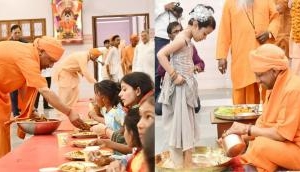
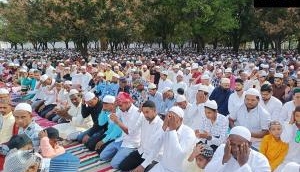
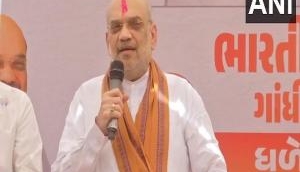
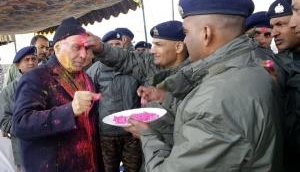
_251049_300x172.jpg)
![BJP's Kapil Mishra recreates Shankar Mahadevan’s ‘Breathless’ song to highlight Delhi pollution [WATCH] BJP's Kapil Mishra recreates Shankar Mahadevan’s ‘Breathless’ song to highlight Delhi pollution [WATCH]](http://images.catchnews.com/upload/2022/11/03/kapil-mishra_240884_300x172.png)

![Anupam Kher shares pictures of his toned body on 67th birthday [MUST SEE] Anupam Kher shares pictures of his toned body on 67th birthday [MUST SEE]](http://images.catchnews.com/upload/2022/03/07/Anupam_kher_231145_300x172.jpg)






